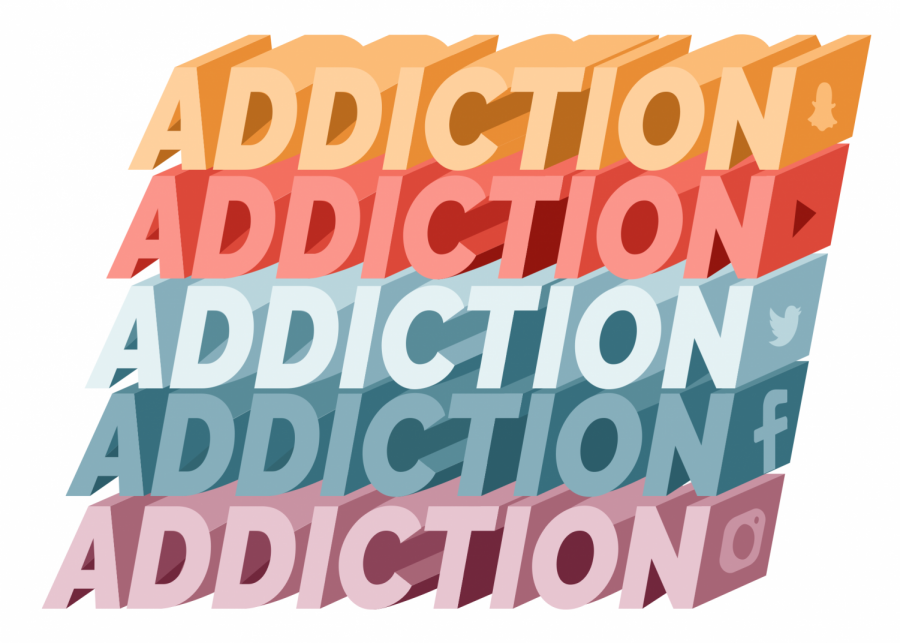Addiction
In today’s society, social media has taken over and for some their well being revolves around the world of likes and comments.
From walking through the halls, to eating in the cafeteria there is always a phone in sight. With new developments in technology the past few decades, social media is now a constant form of communication.
With the world centering around the need for attention, it’s no wonder that this form of constant connection is addicting. So addicting in fact that according to Twitter’s 2018 third quarter results, the number of Twitter users rises nine percent everyday and according to Variety 35,000 snaps are sent every second.
When asked about her daily usage of social media, Sophomore Jahnavi Panchal said, “I’m on my phone all the time.” She adds, “[Social media] is just a habit now that’s hard to break.” This is normal, as according to Common Sense Media, teens spend an average of nine hours a day.
Since the class of 2019 started high school, according to Twitter’s 2018 third quarter results, Twitter has grown from 288 million active users in 2014 to 326 million active users in 2018. Instagram’s usership has grown from 300 million active users in 2014 to one billion active users in 2018, as reported by Instagram. According to Snapchat, usership has grown from 71 million active users in 2014 to 186 million active users in 2018.
This growth and the invention of social media has brought the world closer together than ever before, but it also has the capability to tear people apart. For some, social media can also feel inescapable. This problem is seen everyday, for example, students who are being bullied – the bullies can now harass them online even when they leave school grounds.
Social media provides an outlet for many to express themselves, whether that is positive or not. For many, there is a disconnect between real life and what’s on their screen, making it feel as if there isn’t a real person on the other side and allowing people to hide behind a mask of anonymity. This disconnect serves as justification for many to do or say things they would never do in real life.
Not only is social media constant, it is permanent. The things you say or do right now can impact your future. Even if you delete a post or tweet, it can still be found if someone is looking for it. Jobs and colleges now run background checks on your social media presence. Any tweets or posts that are deemed “too controversial” can be reason for rejection or dismissal. Parkland survivor and avid social media activist David Hogg has been vocal on his Twitter about colleges rejecting him due to his tweets about Parkland.
Social media is not all bad, as it provides confidence for many. Sophomore Safa Ansari believes social media has helped her gain confidence, however, she says, “It’s not mainly where my confidence comes comes from.” According to a study by Kathy Wilcox and James Laird, the less aware women are of their appearance and the state of their bodies, the happier they are after looking at a thin model. Taking it a step further, women who are unaware of or don’t pay much mind to their bodies even gain confidence from looking at models on Instagram.
We sent a survey out to the student body asking how social media makes them feel. One student said that social media has helped them be more confident in themself and made them open and accepting to the diverse society. Additionally, most students said that social media hasn’t really impacted their self image, or that it even had a positive effect on their self image when it did impact them.
On the other hand, the same study from Wilcox and Laird pointed to insecurity for the majority of women tested. In the survey that was sent out, a majority of Olathe North students stated that it was hard to stay confident in their own appearance when they were constantly seeing posts of attractive people on social media. This can be especially damaging to young and impressionable teens, as it can lead to psychological problems such as anxiety disorders or depression.
Despite the negative effects and the tight hold social media has on society, some students believe that it isn’t something that has to control our lives.
Panchal commented, saying, “I don’t think there are [benefits] to be honest. At a point people lived with it and we can still live without it.” Her comments show how even people who are the most connected with social media can separate themselves from it, which is also a benefit for their mental health.
A recent study by researchers at the University of Pennsylvania delivers new findings that limiting social media usage decreases depression, anxiety, and loneliness. The study found that when its experimental group of subjects limited their usage of platforms such as Instagram, Facebook, or Snapchat to only ten minutes a day for three weeks, they showed significant reductions in levels of depression and loneliness in comparison to the control groups and to the baseline monitoring from the first week of the study. Their anxiety also decreased as they had less fear of missing out on what was going on, since they couldn’t get too involved with what was happening online.
Despite the connections we make on social media, it might be a good time to make a change in your routine if you feel yourself getting overwhelmed. Remember, the world might be more connected than ever, but that won’t matter unless you take care of your mental health.

Number of years on the paper: This is Bailey's second year on the paper.
Grade Level: 11th, Junior
Favorite part of Newspaper: "work nights and...

Number of years on the paper: This is Neha's first year on the paper
Favorite part of Newspaper: " "Journalistically, interviewing, but as a class the...

Number of years on the paper: This is Abigail's fourth year on the paper
Grade Level: 12th grade, Senior
Favorite part of Newspaper: "Getting to...





